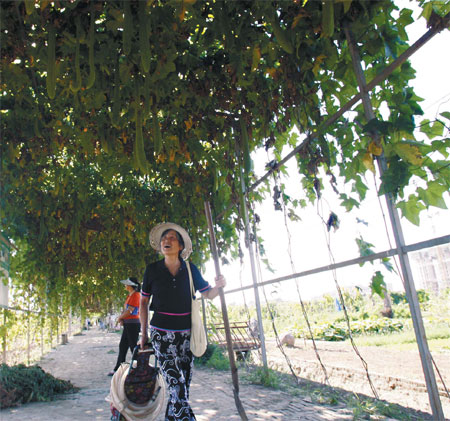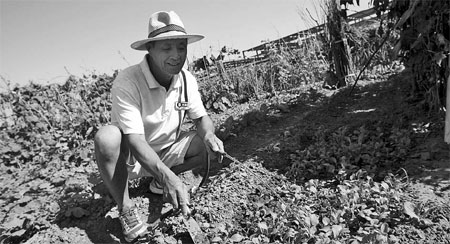Weekend farmers
Updated: 2012-09-02 07:59
By Liu Zhihua(China Daily)
|
|||||||||

|
Zhang Hongwei, newly retired, has found new purpose cultivating his plot in a southern suburb of Beijing. Zhang Wei / China Daily |
Online gardening games such as Farmville gave the IT generation the instant gratification of harvesting fruits and vegetables. Now, many are escaping to the great outdoors on weekends, exchanging keyboards and styluses for hoes and hoses. Liu Zhihua finds out why they've gone back to the land for comfort.
The farm on the outskirts of Beijing is large, spread over more than 9,000 square meters and divided into 1,360 allotments. All the plots have been rented out to weekend farmers, and there are still 100 more applicants on the waiting list.
Yifendi Farm, a cooperative run by Nanyuan Village in Beijing's Fengtai district, is one of the largest allotment farms in the Chinese capital, and it claims to be the first.
"Farming in the real world is more engaging than playing online," says Chen Jiansheng, head of the village, and the main motivator.
"People from the city love farming. We had tenants as soon as we started offering the plots, without any promotion or advertisement."
When Zhang Hongwei chanced upon the Yifendi Farm project in early March, he immediately decided to rent an allotment of 66 square meters, at a cost of 1,200 yuan ($189) a year.
The 63-year-old had been bored since his retirement at that time, and was looking for productive recreation.
Now he is in his allotment every other day, and very happy. He is pleasantly surprised by his rewards: His family doesn't need to buy vegetables from the market any more, because since April, he has been taking home all kinds of produce.
He even has extra for friends and neighbors.
"I didn't expect such a good harvest," Zhang says. "Working at the farm is a kind of exercise for me in the first place. It is more interesting than just working out at sports facilities."
The farm provides not just seeds, organic fertilizers and gardening tools, but also technical support from 15 technicians, with whom Zhang has already made friends.
"Farming brings color to my life," Zhang says. "It feels great when families and relatives thank me for the vegetables I bring them."
Yifendi Farm says most of their allotment tenants are not retirees like Zhang, but young, busy white-collar workers in their 30s and 40s.
Zhang Jie, 40, says he wants to continue farming as long as the farm operates. The telecommunications engineer with a major State-owned enterprise drives 30 minutes every weekend to cultivate the family's two allotments in Yifendi Farm.
"My job requires time and energy. But no matter how madly busy I am, I manage to spend at least one day during the weekends on the plants," Zhang says.
"It is all for my daughter. I want to let her eat safe and delicious vegetables."
When his daughter, now nearly 6, started eating solid food, Zhang became very concerned. He felt that the vegetables sold in supermarkets were no longer of the same quality as those he ate as a child. There were also too many food safety scares.
It occurred to him that he could start an organic vegetable patch so his child could eat healthily, and safely. He put his theory into practice when he found Yifendi Farm.
Zhang is totally involved in the growing process - from applying organic fertilizers, turning over the soil, sowing, weeding, harvesting. His efforts are paying off.
"When I'm in the field, I'm a farmer. I have done everything a farmer will do," Zhang says. "The vegetables taste better and better. Now they have the same mouth-feel and aroma like those I ate as a child."
In addition, his daughter, is getting a slightly different childhood from her city-bred friends.
Every time Zhang goes to his allotments, he takes his daughter along, and she delights in playing in the mud, watching the plants grow and chasing butterflies, observing insects.
When cucumbers ripen on the vine, the little girl will pluck them, wash them and eat them without hesitation.
"She grew up in the field, and never gets sick because she's eating healthy, raw, uncooked vegetables," Zhang says.
"I'm glad she is so close to life on the ground. I think it is good for her."
Another weekend farmer, Jiang Huiping, feels the same. The mother of a 4-year-old girl, who works in a real estate agency, shares a large plot of land with several friends.
The plot is about 800 square meters, in a village in Haidian district, the northwestern suburb of downtown Beijing.
Jiang's family and their friends pay about 30,000 yuan per year for the lease, and hires villagers to look after the plot. The rental also includes utility fees and labor.
Jiang explains that they are too busy to work on the land themselves, and they do not have the skills to do a good job. But during the weekends, they will go down to the farm and take part in the harvesting.
"We avoid using chemical fertilizers and pesticides, and make sure the vegetables are safe to eat," Jiang says.
"Harvesting the vegetables is a great way to relax, and it's a chance to educate our child. We have always hoped that she can learn from nature."
When the girl was 3 months old, the family went mountain climbing. At 9 months, she was taught how to swim in the sea, Jiang says.
And since a year ago, when the family leased the land, the farm has been a weekend playground for her.
She also lends a hand at the farm, washing the mud off the freshly harvested vegetables, and packing them away neatly to bring home.
"She's very young and we don't expect her to be very helpful," Jiang says. "But it is great that she is willing to help, and learning to work."
For designer Wang Liang, farming in the countryside provides both relaxation and a sense of achievement. She has been renting a 40-square-meter piece of land for about half a year at Kafu Farm in Daxing district, south of the city.
In the last few months, she has spent most of her weekends hoeing her plot and carefully tending the eggplants, corns, cucumbers and green peppers she has been growing. Sometimes her mother goes down to help, and points out the wild amaranth and shepherd's purse growing nearby. These wild vegetables are carefully harvested and brought home.
"It is exciting to eat food I planted myself," Wang says. "Besides, the fresh air in countryside is very bracing."
Wang has brought back carloads of eggplants, cucumbers, pumpkins and watermelons to share with her family, including her 90-year-old grandmother.
Wang Xing, the manager of Kafu Farm, says the farm was not planned for allotments, but they decided to adjust to market trends.
It is an experiment that seemed to have worked well, and the farm plans to continue their allotment rental.
They provide facilities for barbecues, and there is a petting zoo on the premises as well.
As for Yifendi Farm, Chen says the village is already planning to extend the allotment sizes next year.
"Farming in countryside will be a lasting trend among city dwellers," Chen says confidently.
"As long as we provide them with help so they can get a good harvest, they will come to farm."
Contact the writer at liuzhihua@chinadaily.com.cn.
(China Daily 09/02/2012 page1)
